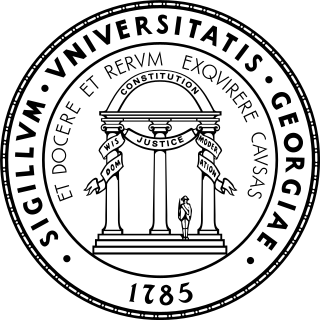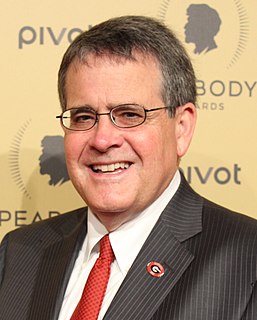Related Research Articles

Arizona State University is a public research university in the Phoenix metropolitan area. Founded in 1885 by the 13th Arizona Territorial Legislature, ASU is one of the largest public universities by enrollment in the U.S.

The University of California, San Francisco (UCSF) is a public land-grant research university in San Francisco, California. It is part of the University of California system and it is dedicated entirely to health science. It is a major center of medical and biological research and teaching.

The University of Georgia is a public land-grant research university with its main campus in Athens, Georgia. Founded in 1785, it is one of the oldest public universities in the United States. It serves as the flagship of the University System of Georgia.

The University System of Georgia (USG) is the government agency that includes 26 public institutions of higher learning in the U.S. state of Georgia. The system is governed by the Georgia Board of Regents. It sets goals and dictates general policy to educational institutions as well as administering the Public Library Service of the state which includes 58 public library systems. The USG also dispenses public funds to the institutions but not the lottery-funded HOPE Scholarship. The USG is the sixth largest university system in the United States by total student enrollment, with 333,507 students in 26 public institutions. USG institutions are divided into four categories: research universities, regional comprehensive universities, state universities, and state colleges.

Robert Beno Cialdini is an American psychologist and academic.
James Barrett Jacobs was the Warren E. Burger Professor of Constitutional Law and the Courts at New York University School of Law, where he was a faculty member since 1982. He was a specialist in criminal law, criminal procedure, and criminal justice.
David Garland is Arthur T. Vanderbilt Professor of Law and professor of sociology at New York University, and professorial fellow in Criminology at Edinburgh Law School. He is well known for his historical and sociological studies of penal institutions, for his work on the welfare state, and for his contributions to criminology, social theory, and the study of social control.
Professor Diane Marie Amann is Regents' Professor of International Law and holds the Emily & Ernest Woodruff Chair in International Law at the University of Georgia School of Law. She has served since mid-2017 as a faculty co-director of the law school's Dean Rusk International Law Center, a position she took up after completing a two-and-a-half-year term as Associate Dean for International Programs & Strategic Initiatives. Additionally, she serves as Professor of International Affairs at the University of Georgia School of Public and International Affairs and as an Affiliated Faculty Member at the University of Georgia African Studies Institute.

Ronald Gordon Ehrenberg is an American economist. He has primarily worked in the field of labor economics including the economics of higher education. Currently, he is Irving M. Ives Professor of Industrial and Labor Relations and Economics at Cornell University. He is also the founder-director of the Cornell Higher Education Research Institute (CHERI).

Jere Wade Morehead is the 22nd and current President of the University of Georgia. He continues as the Josiah Meigs Professor of Legal Studies at the University of Georgia's Terry College of Business, and was previously Senior Vice President for Academic Affairs and Provost.
Christopher J. Schneider is an American sociologist and professor of sociology at Brandon University.
Michael Scott Adams was an American conservative political columnist, writer and professor of criminology at the University of North Carolina Wilmington. He became known for his outspoken opinions, frequently attracting controversy. When he did not receive a promotion to full professor, he filed a lawsuit against the university and eventually won. After many conflicts with students and national coverage of his controversial social media and blog posts, public pressure to have him removed grew and he was eventually asked to retire. Twenty-one days after reaching a retirement settlement with the university, he was found dead in his home with a self-inflicted gunshot wound to the head.

Kevin B. Anderson is an American sociologist, Marxist humanist, author, and professor. Anderson is Professor of Sociology, Political Science and Feminist studies at University of California, Santa Barbara (UCSB). He was previously Professor of Sociology at Northern Illinois University, in DeKalb and Professor of Political Science, Sociology and Women's Studies at Purdue University.
Matt Lee is an American sociologist and criminologist at Louisiana State University (LSU) and university administrator. He is currently the interim Executive Vice President and Provost at LSU. In this role he supports the LSU Board of Supervisors as the Chief Academic Officer for all LSU campuses and serves as the Chief Academic Officer and Chief Operating Officer for the Flagship campus. As a servant leader in higher education, his personal and administrative motto is 'Excellence through Innovation'.
Ronald Louis Akers is an American criminologist and professor emeritus of criminology and law at the University of Florida's College of Liberal Arts and Sciences.
Travis Cameron Pratt is an American criminologist and fellow at the University of Cincinnati Corrections Institute in Cincinnati, Ohio. He is the author of over 100 peer-reviewed papers on topics such as prison policy and theoretical criminology. He is particularly known for his research on private prisons.

Richard T. Wright is an American criminologist. He is Board of Regent's Professor of Criminal Justice and Criminology at Georgia State University (GSU) in the Andrew Young School of Policy Studies. He served as Chair of the Department of Criminal Justice and Criminology at GSU from 2014–2018, and was elected a Fellow of the American Society of Criminology in 2009.
Matt F. Delmont is an American historian. He is the Sherman Fairchild Distinguished Professor of History at Dartmouth College and former Professor of History at Arizona State University (ASU) and Scripps College.
Nikki Jeanette Jones is an American sociologist. She is an associate professor of African American Studies at the University of California, Berkeley.
Bernadette J. Mazurek Melnyk is an American nurse. She is a professor of pediatrics and psychiatry at Ohio State University College of Medicine and dean of the College of Nursing. Melnyk is also the editor in chief of the journal Worldviews on Evidence Based Nursing.
References
- ↑ "Simons, Ronald L." id.loc.gov. Retrieved January 8, 2021.
- ↑ "Ron Simons". sociology.uga.edu. Retrieved January 8, 2021.
- ↑ "Ronald L. Simons CV" (PDF). sociology.uga.edu. Retrieved January 8, 2021.
- ↑ "Criminology adds top scholars for 2013 academic year". asunow.asu.edu. December 10, 2012. Retrieved January 8, 2021.
- ↑ "Professor's work addresses new perspectives in behavioral science". asunow.asu.edu. September 26, 2013. Retrieved January 8, 2021.
- ↑ "Criminology professors receive national awards". asunow.asu.edu. November 27, 2013. Retrieved January 8, 2021.
- ↑ "Leslie Gordon Simons and Ronald Simons Receive Grant". sociology.uga.edu. February 2, 2016. Retrieved January 8, 2021.
- ↑ "Ron Simons Fellow of American Society of Criminology". sociology.uga.edu. February 2, 2016. Retrieved January 8, 2021.
- ↑ Williams, Camie (March 27, 2019). "Ronald Simons receives SEC Faculty Achievement Award". news.uga.edu. Retrieved January 8, 2021.
- ↑ "Ronald Simons Named Regents Professor". sociology.uga.edu. May 7, 2020. Retrieved January 8, 2021.
- ↑ "Ron Simons is the PI on a newly-funded project by the National Institute on Aging". sociology.uga.edu. September 16, 2020. Retrieved January 8, 2021.